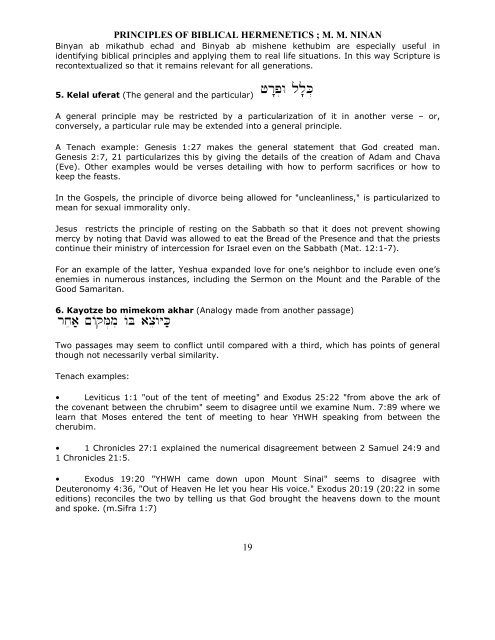Biblical Hermeneutics
You also want an ePaper? Increase the reach of your titles
YUMPU automatically turns print PDFs into web optimized ePapers that Google loves.
PRINCIPLES OF BIBLICAL HERMENETICS ; M. M. NINAN<br />
Binyan ab mikathub echad and Binyab ab mishene kethubim are especially useful in<br />
identifying biblical principles and applying them to real life situations. In this way Scripture is<br />
recontextualized so that it remains relevant for all generations.<br />
5. Kelal uferat (The general and the particular)<br />
A general principle may be restricted by a particularization of it in another verse – or,<br />
conversely, a particular rule may be extended into a general principle.<br />
A Tenach example: Genesis 1:27 makes the general statement that God created man.<br />
Genesis 2:7, 21 particularizes this by giving the details of the creation of Adam and Chava<br />
(Eve). Other examples would be verses detailing with how to perform sacrifices or how to<br />
keep the feasts.<br />
In the Gospels, the principle of divorce being allowed for "uncleanliness," is particularized to<br />
mean for sexual immorality only.<br />
Jesus restricts the principle of resting on the Sabbath so that it does not prevent showing<br />
mercy by noting that David was allowed to eat the Bread of the Presence and that the priests<br />
continue their ministry of intercession for Israel even on the Sabbath (Mat. 12:1-7).<br />
For an example of the latter, Yeshua expanded love for one’s neighbor to include even one’s<br />
enemies in numerous instances, including the Sermon on the Mount and the Parable of the<br />
Good Samaritan.<br />
6. Kayotze bo mimekom akhar (Analogy made from another passage)<br />
Two passages may seem to conflict until compared with a third, which has points of general<br />
though not necessarily verbal similarity.<br />
Tenach examples:<br />
• Leviticus 1:1 "out of the tent of meeting" and Exodus 25:22 "from above the ark of<br />
the covenant between the chrubim" seem to disagree until we examine Num. 7:89 where we<br />
learn that Moses entered the tent of meeting to hear YHWH speaking from between the<br />
cherubim.<br />
• 1 Chronicles 27:1 explained the numerical disagreement between 2 Samuel 24:9 and<br />
1 Chronicles 21:5.<br />
• Exodus 19:20 "YHWH came down upon Mount Sinai" seems to disagree with<br />
Deuteronomy 4:36, "Out of Heaven He let you hear His voice." Exodus 20:19 (20:22 in some<br />
editions) reconciles the two by telling us that God brought the heavens down to the mount<br />
and spoke. (m.Sifra 1:7)<br />
19


















